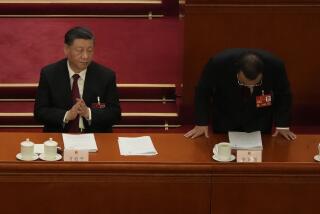Illness of Deng’s Top Rival Spurs Infighting in China
- Share via
BEIJING — Chinese leader Deng Xiaoping’s top rival for influence within the Chinese Communist Party has become seriously ill, and the prospect of his death has reportedly set off a new round of infighting over China’s future political leadership.
According to both Chinese and Western sources, Chen Yun--a member of the five-man Standing Committee of the party’s Politburo and the most powerful conservative critic of Deng’s reform policies--is in extremely frail condition and is not expected to live long.
Chen, 81, is the party leader who directed China’s economic planning and reconstruction after the Communist victory of 1949. Over the last few years, Chen has argued strenuously that China should continue to emphasize traditional socialist central planning and should not move too far or fast toward a market economy.
In China, the death of a leader has sometimes been followed by an abrupt decline in the status of his political supporters. Deng himself was ousted from power after the death of Premier Chou En-lai in 1976. After Mao Tse-tung died later that year, Mao’s wife, Jiang Qing, and her allies were rounded up and thrown into jail.
In recent weeks, with his health deteriorating, Chen has tried to have a leading conservative ideologue, former Propaganda Minister Deng Liqun, named general secretary of the Communist Party, according to Chinese sources.
Deng Xiaoping reportedly rounded up enough support to defeat Chen’s proposal. Last Saturday, the Chinese regime announced that Premier Zhao Ziyang will remain in charge of both the Communist Party and the government until a party congress is held next fall.
Western sources said Chen’s kidneys have failed. A Chinese source said Chen is now so ill that members of the party Politburo have begun to get daily updates on his health condition. The same procedure was reportedly followed last fall in the month before the death of a senior Chinese military leader, former Marshal Ye Jianying.
Chen’s death would underscore the importance of the changes now taking place at the highest level of the 44-million-member Communist Party.
Of the five members of the Politburo Standing Committee, the party’s top leadership group, two individuals--Chen and President Li Xiannian--are in poor health, and one, former Communist Party Secretary Hu Yaobang, is in political disgrace. The other two members are Deng Xiaoping and Premier Zhao.
The political maneuvering within the party intensified last January when Hu, who was Deng Xiaoping’s protege, resigned as party leader in the wake of student demonstrations for democracy. Premier Zhao was named “acting” party secretary to replace him.
Chen is the only figure in the party hierarchy who has served in top leadership positions for as long as has Deng. He first became a member of the Politburo Standing Committee in 1956.
After directing China’s recovery in the early 1950s from the civil war, Chen became one of the leading critics of the radical economic policies of Mao Tse-tung. But over the past decade, he has complained increasingly about some of the harmful side effects of Deng Xiaoping’s economic reform program.
Speaking to a Communist Party conference in 1985, Chen sounded what amounted to a clarion call to conservative forces unhappy with Deng’s economic reforms.
Denounced Officials
Chen denounced party officials who he said have “forsaken the socialist and Communist ideal.” He lashed out at rampant corruption and at some officials’ abandonment of “national dignity” in dealing with foreigners. And he said the leadership needed to pay more attention to grain production and to problems of poverty.
The man Chen reportedly sought to have installed as party secretary, Deng Liqun, was the principal architect of the 1983 campaign against “spiritual pollution,” a code term for Western influences.
That campaign was scuttled after some local officials began requiring people to cut their hair and stop wearing Western-style fashions. But in recent months, official Chinese publications such as the party theoretical organ Red Flag have begun to use the phrase again.
More to Read
Sign up for Essential California
The most important California stories and recommendations in your inbox every morning.
You may occasionally receive promotional content from the Los Angeles Times.










